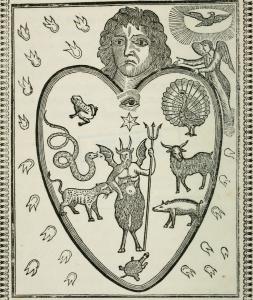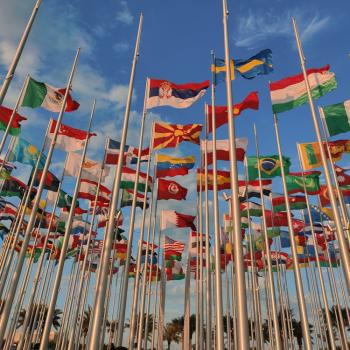
While faith and reason should go together, that should not mean we confuse what we can derive from reason alone as revealing the fullness of our faith. The revealed truths of Christianity transcend human understanding, and therefore, human rationality. We can apprehend elements of the absolute truth, and then use our reason to engage what we have apprehended, to derive meaning and value from what has been revealed, but we must not think the focus of our faith should be engaging such rational analysis. Sadly, too many people have come to treat it as what their Christian faith is about; they think they can determine and prove the truths of the faith with reason alone, and in doing so, they undermine the content of those truths, as they end up denying the transcendent mystery which reason cannot prove. Others do the opposite, that is, they turn the faith into some sort of simplified fideism where the intellect need not be engaged, so that such Christians believe what they are told, and do so without question. While Lanfranc’s writings show that he used his reason to engage the faith, he certainly seems to have leaned toward fideism when he wrote, “The mystery of faith can be salubriously believed, but is not able to be investigated usefully.” [1] We are called to believe what has been revealed, but we are to do so with our whole being, with our mind, our body, our soul, even with that which is often described as our “heart.” Each element of our person should integrate with every other element of our being so that our engagement of the faith incorporate all of them in a holistic balance. When we cut off one element of our being, our engagement of the faith becomes disjointed, and what we discern and teach about the faith, will likely suffer.
At the core of the Christian faith is the realization of what love is, and how we should engage and put into practice what we have learned about love. Each of the major teachings of the Christian faith can be shown to connect to its teaching of love, and the reason for this is that Christians have learned that God is love. We are shown such love in the way God assumed human nature in the incarnation, as we are shown God’s great love makes room for us to act and react with a similar love (because we have been made in the image and likeness of God). To engage such love, we must love, not only God, but all that God loves, without trying to use reason to find some excuse to ignore the way we are to love, as Vladimir Solovyov explained to Mikhail S. Soloviev:
Speaking in general – love one another. Much is incomprehensible to us. There is no greater foolishness in this mixed-up world than to apply the wooden yardstick of your reason everywhere. [2]
Love is able to appreciate mystery because it is attracted to it, having us gaze upon our beloved, seeking to know and understand everything about them, including and especially those things about them which have been hidden from us. Love gives us the means to engage them, to explore who they are, and why we love them. Our whole being is affected by it, so that, when we explore the truths of God, we do not end up focusing on our intellect and the dry and limited representation of the truth reason will produce when left by itself.
Sadly, too many Christians have been encouraged to focus on their intellectual side that they turn Christianity into a dry rationalism, one which leads to a rather dead end. They lose sight of love and the light of truth which is revealed in such love. This has often been a problem with seminary education as Archbishop Raya explained based upon his own experience in seminary: “The few who could master intellectual syllogisms and abstractions were proud of their intellectual powers. Sometimes they became haughty, and quite often bored with religion.” [3] Those who think they know it all do not know it all, and as a result, they close themselves off from the greater truth, to that which do not yet know or understand; what truth they do apprehend will eventually no longer satisfy them, and since they have not learned how to open themselves up to the mystery which transcends their knowledge and reason, they end up finding the faith unsatisfying. We must not let ourselves be taken in by such a rationalistic, and closed-ended, approach to the faith; we must recognize the greater mystery of the truth which lies beyond what we have apprehended, and in doing so, recognize how each and every day is an opportunity for us to grow, and through that growth, apprehend even more of the truth:
Each day is a new mystery from God, it is the mystery of our life. God would not give us days if they were not an unfolding mystery. And we must seek for ourselves a place among these possibilities, we must walk before Him, making sure that our steps are as near to Him as possible. [4]
Religious faith is meant to be an active faith; what we study and learn should help point us to the greater truth, to the transcendent mystery, which we should engage with the fullness of our being. When must avoid the mistake of the manualists. We should not think we can capture the faith and all that we can and should do in some book. In the end, we must do our part. We can see this in relation to prayer. We can talk about prayer, we can learn what others have said and done, what others have experienced in prayer. We can be given prayers to recite. We can even give what appears to manuals which present us methods which suggest ways to pray. But in the end, the only way to truly learn about prayer is to pray; similarly, therefore, we find this is true in relation to our engagement of the greater mystery of the faith – we must engage it, allowing it to reveal itself to us, instead of trying to create it and force it into an easy formula to recite:
There is a great mystery in human experience. There is a greater mystery yet in religious experiences. At one time we thought that patient analysis and scientific formulations could express and release such religious experiences. Theologians forgot the feast, the sublime and religious experience. They wrote books on how to pray and how to worship, just as others wrote books on how to construct a machine, or to organize a corporation. Can a book really teach how to pray or how to swim? Is not praying like swimming, a “letting go”? Swimming is an act of confidence that cannot be taught or commanded. [5]
In the end, we must make room for the ineffable aspect of the faith, just as we make room for our beloved in our lives. We must make sure our engagement of the faith is a holistic enterprise, one which engages our mind, and with it , our reason, but also, one which engages other aspects of our being, including that which is often described as “the heart.” We must find a way to bring them together, but also, we must do so in such a way as we remain open to the mystery which transcends us, the mystery which can continue to fascinate us and make sure there is more for us to learn, more for us to experience, so that we are never bored. Whenever we turn the faith into some sort of formula to memorize and recite, we cut ourselves off that mystery and find the faith itself to be limited; no wonder, after the way the faith has been turned by many into mere apologetics, those who are converted by such apologetics find their faith to be limited, and often, in the end, insufficient. They have no stability, and so they end up jumping from faith tradition to faith tradition, each time engaging those traditions as mere intellectual enterprises, each time, therefore, finding nothing which satisfies, as their souls want and needs more. .
[1] Lanfranc of Canterbury, “On the Body and Blood of the Lord” in Lanfranc of Canterbury: On the Body and Blood of the Lord and Guitmund of Aversa: On The Truth of the Body and Blood of Christ in the Eucharist. Trans. Mark G. Vaillancourt (Washington, DC: Catholic University of America Press, 2009), 52.
[2] Vladimir Soloviev, The Karamazov Correspondence. Letters of Vladimir S. Soloviev. Trans. and ed. Vladimir Wozniuk (Boston: Academic Studies Press, 2019), 253 [Letter to Mikhail S. Soloviev, undated].
[3] Archbishop Joseph Raya, The Abundance of Love: The Incarnation and Byzantine Tradition (Combermere, ON: Madonna House Publications, 1989; 3rd ed.: 2016), 5.
[4] Sergius Bulgakov. Spiritual Diary. Trans. Mark Roosien and Roberto J. De La Noval (Brooklyn, NY: Angelico Press, 2022), 69 [17/30.VIII.1924].
[5] Archbishop Joseph Raya, The Abundance of Love: The Incarnation and Byzantine Tradition, 2.
Stay in touch! Like A Little Bit of Nothing on Facebook.
If you liked what you read, please consider sharing it with your friends and family!
N.B.: While I read comments to moderate them, I rarely respond to them. If I don’t respond to your comment directly, don’t assume I am unthankful for it. I appreciate it. But I want readers to feel free to ask questions, and hopefully, dialogue with each other. I have shared what I wanted to say, though some responses will get a brief reply by me, or, if I find it interesting and something I can engage fully, as the foundation for another post. I have had many posts inspired or improved upon thanks to my readers.












